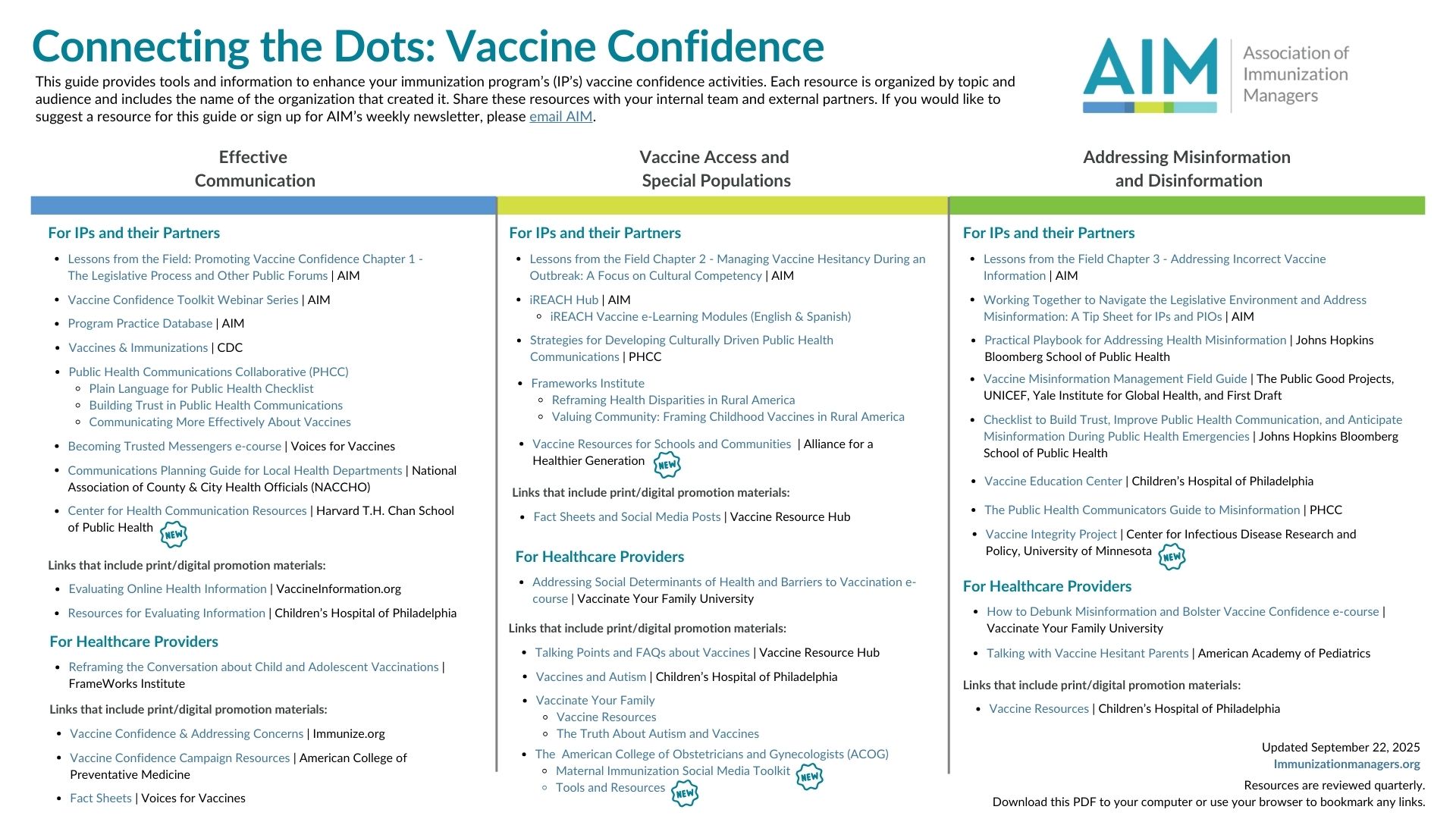This toolkit is designed to equip members of the Association of Immunization Managers (AIM) and their staff with the tools and information necessary to promote vaccine confidence across the nation and its territories. For even more resources, visit the AIM resource library.
Connecting the Dots: Vaccine Confidence
Connecting the Dots: Vaccine Confidence provides tools and information to enhance your immunization program’s (IP’s) vaccine confidence activities. Each resource is organized by topic and audience and includes the name of the organization who created it. Share any of the resources with your internal team and external partners that align with your program’s goals!
Vaccine Confidence Toolkit Webinar Series: Correlation and Causation: Understanding and Debunking Claims Linking Vaccines and Autism
AIM hosted the Correlation and Causation: Understanding and Debunking Claims Linking Vaccines and Autism webinar on June 24. During this webinar, attendees heard from AIM Chief Medical Officer Michelle Fiscus, MD, FAAP. Attendees learned about autism spectrum disorder and how the vaccine-autism claim emerged, gained traction, and why it remains persistent. Dr. Fiscus summarized key studies that have debunked the claim and shared practical communication tools that immunization programs and health care providers can use to engage families and communities in informed conversations about vaccines.
Webinar Resources
- Webinar slides
- AIM Vaccine Confidence Toolkit
- Vaccine Education Center | Children’s Hospital of Philadelphia
- Vaccine Safety: Examine the Evidence | HealthyChildren.org
- Autism Basics | Autism Science Foundation
- Questions About Vaccines | Vaccinate Your Family
- Autism’s False Prophets | Columbia University Press
- Vaccines Did Not Cause Rachel’s Autism | Hopkins Press
- The Autistic Brain: Helping Different Kinds of Minds Succeed | Dr. Temple Grandin
- Shot in the Arm | PBS
- Virulent: The Vaccine War | PBS
- MMR Vaccine Does Not Cause Autism | Immunize.org
- Evidence Shows Vaccines Unrelated to Autism | Immunize.org
- Fact Checked: Vaccines: Safe and Effective, No Link to Autism | AAP
- The Truth About Autism and Vaccines | Vaccinate Your Family & Autism Science Foundation
- Vaccines Do Not Cause Autism | Public Health Communications Collaborative
- CDC Document: Thimerosal-containing vaccines and neurodevelopmental outcomes: Review of the evidence | Uploaded by NPR
Vaccine Confidence Toolkit Webinar Series: Sustaining Community-based Partnerships to Build Vaccine Confidence
AIM hosted the Sustaining Community-based Partnerships to Build Vaccine Confidence webinar on September 30. Attendees learned about innovative partnerships between local/state/jurisdictional immunization programs and community-based organizations, and heard how these partnerships that promote vaccine confidence among communities of focus can be sustained and strengthened as the immunization environment continues to evolve post pandemic.
Webinar panelists included:
- Michelle Gilstrap, MPH, Immunization Program Manager, San Antonio Metropolitan Health District
- Emman Parian, MPH, Immunization Program Manager, Commonwealth of the Northern Mariana Islands Immunization Program
- Leah Romano, MPH, Countywide Vaccine Coordinator, Allegheny County Health Department
- Michaela Avino, MPH, REACH Program Manager, Allegheny County Health Department
Vaccine Confidence Toolkit Webinar Series: Utilizing Infodemiology to Improve Vaccine Confidence: Resources for Immunization Programs Managers
AIM hosted the Utilizing Infodemiology to Improve Vaccine Confidence: Resources for Immunization Programs Managers webinar on July 16. Attendees heard from Joe Smyser, Ph.D., MSPH, CEO at Public Good Projects, and Jessica Malaty Rivera, MS, infectious disease epidemiologist and science communicator at de Beaumont Foundation. Dr. Smyser and Jessica discussed infodemiology, a public health discipline that studies the spread of information with the goal of improving health, how immunization programs and partners can utilize infodemiology resources to improve vaccine confidence, and science communication tips for health care providers and public health professionals.
Webinar Resources
- Webinar slides
- AIM Vaccine Confidence Toolkit
- Infodemiology.com
- Infodemiology Training Program
- Infodemiology Monitoring Lab
- Infodemiology Contact Form
- CDC Crisis & Emergency Risk Communication (CERC) Program
- Talkwalker
- CrowdTangle
- Johns Hopkins Bloomberg School of Public Health Practical Playbook for Addressing Health Misinformation
Vaccine Confidence Toolkit Webinar Series: A Playbook for Addressing Health Misinformation: Applications for Immunization Programs and Partners
On April 30, AIM held the webinar A Playbook for Addressing Health Misinformation: Applications for Immunization Programs and Partners. During this webinar, attendees learned from Tara Kirk Sell, Ph.D., MA, and Aishwarya Nagar, MPH, about the Johns Hopkins Center for Health Security’s Practical playbook for addressing health misinformation, which takes a hands-on approach to help public health practitioners, medical professionals, and health communicators recognize and respond to health-related rumors and misinformation. Attendees also heard from Tad Sooter, public information officer at the Kitsap Public Health District, about his real-world experiences implementing the playbook’s concepts and other strategies to address misinformation and build trust.
This webinar was supported by the Centers for Disease Control and Prevention (CDC) of the U.S. Department of Health and Human Services (HHS). The contents of this webinar reflect the views of the author(s) and do not necessarily represent the official views of, nor an endorsement, by CDC, or the U.S. Government.
Vaccine Confidence Toolkit Webinar Series: Using Qualitative Research to Increase Vaccination Access and Uptake in Under-Immunized Communities
On June 8, AIM hosted the “Using Qualitative Research to Increase Vaccination Access and Uptake in Under-Immunized Communities” webinar. Attendees learned about rapid evidence-based qualitative research methods that can provide insight into how to build confidence in routine vaccinations among under-immunized communities.
Dr. Brett Craig from the World Health Organization Regional Office for Europe shared how to:
- Design and conduct rapid qualitative research with different under-immunized communities
- Better understand communities’ routine vaccination drivers and barriers
- Use qualitative research results and strategies to develop community-tailored interventions that increase vaccine confidence, access, and routine vaccination uptake
- Presentation slides
- World Health Organization (WHO): European Immunization Agenda 2030
- WHO: Rapid qualitative research to increase COVID-19 vaccination uptake: a research and intervention tool
- WHO: TIP – Tailoring Immunization Programmes
- WHO: Communicating with patients about COVID-19 vaccination
- WHO: Communicating with health workers about COVID-19 vaccination
- WHO: Vaccine Crisis Communication Manual
- WHO: A field guide to qualitative research for new vaccine introduction: step-by-step instructions to help immunization programmes understand their target audiences before communicating about the introduction of a new vaccine
Vaccine Confidence Toolkit Webinar Series: Refreshing Our Conversations About Child and Adolescent Vaccinations
AIM hosted the “Strengthening Vaccine Confidence: Refreshing our Conversations about Child and Adolescent Vaccinations” webinar on May 4. This event featured evidence-based recommendations designed to equip public health communicators, advocates, and health care providers with the needed strategies to effectively build an understanding of and support for child and adolescent vaccinations. Dr. Julie Sweetland from FrameWorks Institute provided participants with research-based insights to implement recommendations in their jurisdictions and build vaccine confidence across their diverse communities through an interactive presentation and Q&A panel.
Vaccine Confidence Toolkit Webinar Series: An Innovative Community Partnership to Increase Vaccine Confidence and Access
On Wednesday, March 29, AIM hosted the “An Innovative Community Partnership to Increase Vaccine Confidence and Access” webinar. This webinar featured promising practices to increase vaccine confidence and uptake in communities. With presentations and a Q&A panel, attendees learned how partnering with trusted messengers, such as community basic needs organizations, can improve vaccination rates and vaccine equity.
Presentations included:
- Troy Moore from National Diaper Bank Network (NDBN) gave an overview of NDBN’s participation in the HHS We Can Do This campaign to increase confidence and uptake of COVID-19 vaccines and reinforce basic prevention measures.
- Doug Adair from Nashville Diaper Connection (NashDiaper) shared the success of partnering with the Tennessee immunization program to develop the Connections™ Program, recognized by the Association of Maternal & Child Health Programs (AMCHP) as a promising practice.
- Michelle Fiscus, MD, AIM Chief Medical Officer, discussed how partnerships can be replicated in other jurisdictions.
Webinar Resources
Vaccine Confidence Toolkit Webinar Series: Translating Vaccine Confidence into Practice
AIM hosted the Translating Vaccine Confidence Research into Practice Webinar on Tuesday, September 6, 2022. This webinar featured three evidence-based models to increase vaccine confidence in communities:
- the ASPIRE framework
- LetsTalkShots
- the ImmYounity module
Through presentations and a Q&A panel, immunization programs gained new tools to help healthcare providers, pharmacists, and community partners increase vaccine confidence in their communities.
Speakers:
Angela Shen, ScD, MPH; Visiting Research Scientist, Children’s Hospital of Philadelphia; Adjunct Associate Professor, Perelman School of Medicine & Senior Fellow, Leonard Davis Institute, University of Pennsylvania
Daniel Salmon, Ph.D., Director and Professor, Institute for Vaccine Safety at Johns Hopkins Bloomberg School of Public Health
Amy Nicholas, PharmD, Medical Managed Care Director, Vaccines at Sanofi (presentation not recorded)
Presentation Resources
- Webinar slides
- CHOP Vaccine Education Center Modules: Communicating about Vaccines – COVID-19 & More
- LetsTalkCOVIDVaccines
- LetsTalkShots
- Vaccines.com
- ImmYounity Module for Healthcare Providers
- AIM Position Statement on Personal Belief Exemptions from State Vaccination Mandates
- AIM Adolescent Immunization Toolkit
- AIM Vaccine Confidence Toolkit
Vaccine Confidence Toolkit Webinar Series: Engaging Rural Pharmacies to Increase Vaccine Access and Confidence
AIM hosted Engaging Rural Pharmacies to Increase Vaccine Access and Confidence Webinar on Tuesday, January 18, 2022. The webinar provided resources and perspectives from Laura Lee Hall, Ph.D., President of the Center for Sustainable Health Care Quality and Equity, who discussed the flu and COVID-19 vaccine DRIVE Toolkit (Demonstrating Real Improvement in Value and Equity). Amy Nicholas PharmD, Medical Managed Care Director at Sanofi Pasteur, shared the ImmYounity module for pharmacists in having vaccine conversations with patients. Through presentations, highlighted resources, and an interactive Q&A panel, immunization programs learned how pharmacies can play a role in bridging vaccine access gaps in rural communities.
Speakers:
Laura Lee Hall Ph.D. (President of the Center for Sustainable Health Care Quality and Equity)
Amy Nicholas PharmD (Medical Managed Care Director at Sanofi Pasteur)
Presentation Resources
Vaccine Confidence Toolkit Webinar Series: Understanding Rural Health Challenges and Building Successful Partnerships to Achieve Vaccine Confidence
AIM hosted Understanding Rural Health Challenges and Building Successful Partnerships to Achieve Vaccine Confidence Webinar on Tuesday, November 9, 2021. The webinar provided perspectives from the immunization coalition and program leaders about how they’ve partnered to boost vaccine confidence, as well as national perspectives on challenges and strategies in rural communities for overcoming access and vaccine hesitancy issues. Through presentations and an interactive Q&A panel, Immunization Programs learned best practices for creating successful partnerships to build vaccine confidence.
Speakers:
Dr. Yabo Beysolow (Pediatrician, Subject Matter Expert, REACH)
Karen Sharpnack (Executive Director, Idaho Immunization Coalition)
Presentation Slides
Vaccine Confidence Toolkit Webinar Series: Partnering with Community Health Workers to Increase Vaccine Confidence
AIM hosted the Partnering with Community Health Workers to Increase Vaccine Confidence on October 4, 2021. The webinar provided perspectives from community health workers and immunization programs and their important role in health systems and public health through presentations and an interactive Q&A panel. Watch to learn best practices for building partnerships with community health workers.
Speakers:
Alma Galván (Migrant Clinicians Network)
Denise Smith (Executive Director; National Association of Community Health Workers)
Venus Ginés (President/Founder of Día de la Mujer Latina)
Michelle Di Miscio and Brianne Ramos, (Washington State Department of Health – Community Health Workers program)
Presentation Slides
Webinar Notes
Vaccine Confidence Toolkit Webinar Series: Engaging Faith Leaders in Improving Vaccine Confidence
On April 7, 2021, AIM hosted an interfaith webinar with religious leaders from Muslim, Jewish, and Christian communities on building vaccine confidence in faith communities. Through presentations and an interactive Q&A panel, presenters shared best practices for building partnerships with faith leaders to increase vaccine confidence.
Presentation Slides
Vaccine Confidence Toolkit Webinar Series: Engaging Communities to Build Vaccine Confidence
To successfully build vaccine confidence in a community, you need to engage multiple types of community leaders to build trust and address vaccine misinformation. Public health’s strongest immunization advocates include parents, coalitions, and religious and community leaders. On November 10, 2020, AIM hosted a webinar with several advocacy groups who shared their work to educate their stakeholders on vaccination and offered tips/lessons learned for engaging communities to build vaccine confidence.
Presentation Slides
Vaccine Confidence Toolkit Webinar Series: Increasing Flu Vaccine Confidence Within African American Communities
On August 18, 2020, AIM hosted the second webinar in its Vaccine Confidence Webinar series. The webinar focused on recent research on flu vaccine uptake trends within African American communities and offered examples of public health partnerships supporting flu vaccine confidence.
Dr. Sandra C. Quinn of the University of Maryland Center for Health Equity presented her research related to the cultural factors and demographic trends within African American communities that influence flu vaccine uptake. Dr. Laura Lee Hall of the Center for Sustainable Health Care Quality and Equity presented on building partnerships with health care systems and researchers to identify ways to increase equitable flu vaccine coverage.
Presentation Slides
Dr. Quinn's Published Research
Download the following published research articles from Dr. Quinn:
- “You don’t trust a government vaccine”: Narratives of institutional trust and influenza vaccination among African American and white adults (2019, PDF)
- Home remedy use and influenza vaccination among African American and white adults: An exploratory study (2019, PDF)
- Using classification and regression tree analysis to explore parental influenza vaccine decisions (2019, PDF)
- African American adults and seasonal influenza vaccination: Changing our approach can move the needle (2018, PDF)
- Breaking down the monolith: Understanding flu vaccine uptake among African Americans (2018, PDF)
- Exploring Racial Influences on Flu Vaccine Attitudes and Behavior: Results of a National Survey of African American and White Adults (2017, PDF)
- Exploring racial influences on flu vaccine attitudes and behavior: Results of a national survey of White and African American adults (2017, PDF)
- Determinants of trust in the flu vaccine for African Americans and Whites (2017, PDF)
- Determinants of influenza vaccination among high-risk Black and White adults (2017, PDF)
- The influence of social norms on flu vaccination among African American and White adults (2017, PDF)
- Exploring the Continuum of Vaccine Hesitancy between African American and White Adults: Results of a Qualitative Study (2016, PDF)
Lessons From the Field: Promoting Vaccine Confidence
Lessons from the Field: Promoting Vaccine Confidence provides key lessons learned from select immunization programs and stakeholders that have substantial experience addressing vaccine hesitancy and vaccine confidence in their communities. The three chapters of the guide cover the legislative process, cultural competence, and incorrect vaccine information.
Chapter 1: The Legislative Process and Other Forums
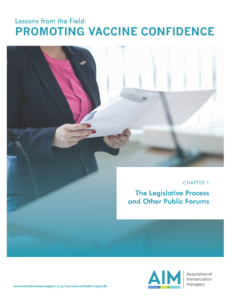
Chapter 1 of Lessons From the Field: Promoting Vaccine Confidence highlights insight, lessons learned, and resources to help immunization programs minimize the impact of vocal vaccine opposition during legislative and rulemaking processes and maximize efforts to inform policymakers of the value of immunization.
Chapter 2: Managing Vaccine Hesitancy During an Outbreak - a Focus on Cultural Competence
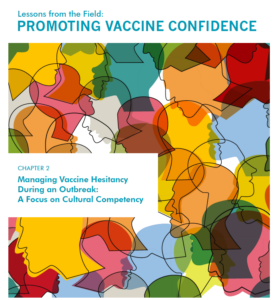
In chapter 2 of Lessons from the Field: Promoting Vaccine Confidence we describe important steps for identifying and engaging with communities at risk for vaccine-preventable diseases in culturally competent ways to manage vaccine hesitancy, particularly in outbreak situations. Highlighted within each step are key considerations, experiences from the field, immunization program and stakeholder insight, lessons learned, and resources to support programs’ efforts to engage communities.
Chapter 3: Addressing Incorrect Vaccine Information
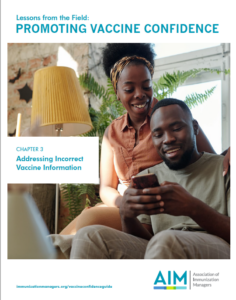
In chapter 3 of Lessons from the Field: Promoting Vaccine Confidence we describe important steps for understanding and addressing incorrect vaccine information; summarizes the different types of incorrect information; and provides key considerations, experiences from the field, immunization program insight, lessons learned, and resources to help programs (and their partners) address incorrect vaccine information.
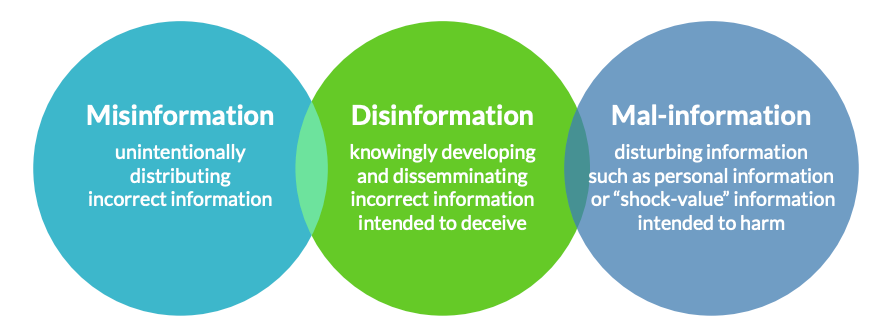
Incorrect Vaccine Information
Read the 2020 environmental scan (brief summary and full report) and the 2021 COVID-19 misinformation report to learn more about vaccine hesitancy and AIM's recommendations.
Correlation and Causation: Understanding and Debunking Claims Linking Vaccines and Autism
During this webinar, attendees learned about autism spectrum disorder and how the vaccine-autism claim emerged, gained traction, and why it remains persistent.
Connecting the Dots: Vaccine Confidence
The Vaccine Confidence Connecting the Dots guide provides tools and information to enhance your immunization program’s (IP) vaccine confidence activities.
Sustaining Community-based Partnerships to Build Vaccine Confidence
AIM hosted the Sustaining Community-based Partnerships to Build Vaccine Confidence webinar on September 30.

